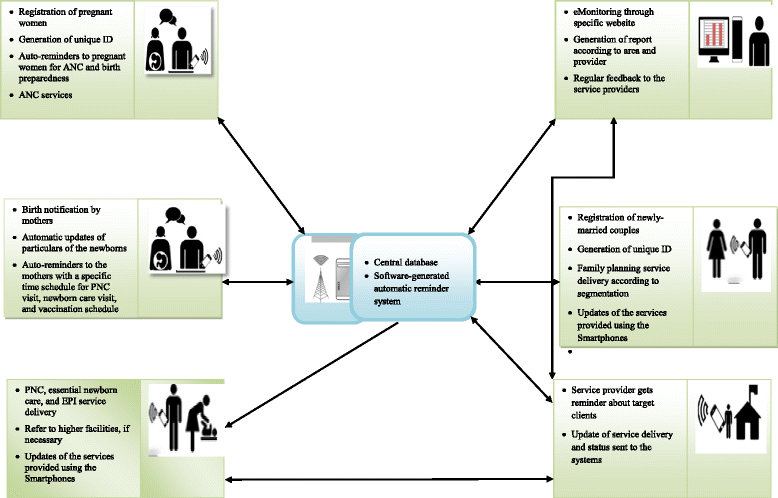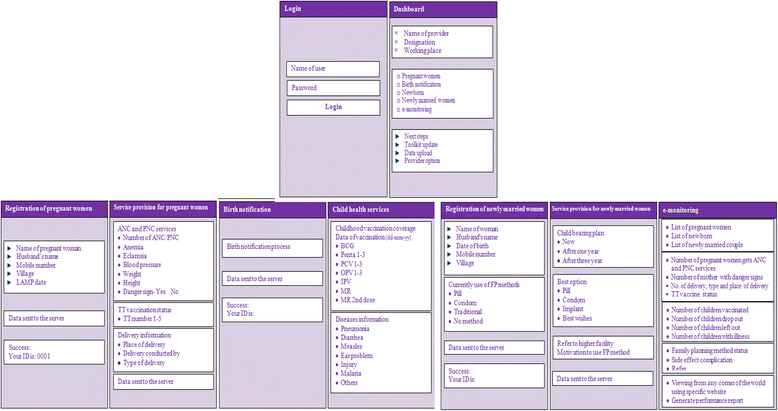Impact of mobile phone-based technology to improve health, population and nutrition services in Rural Bangladesh: a study protocol
- PMID: 28683742
- PMCID: PMC5500967
- DOI: 10.1186/s12911-017-0502-9
Impact of mobile phone-based technology to improve health, population and nutrition services in Rural Bangladesh: a study protocol
Abstract
Background: Mobile phone-based technology has been used in improving the delivery of healthcare services in many countries. However, data on the effects of this technology on improving primary healthcare services in resource-poor settings are limited. The aim of this study is to develop and test a mobile phone-based system to improve health, population and nutrition services in rural Bangladesh and evaluate its impact on service delivery.
Methods: The study will use a quasi-experimental pre-post design, with intervention and comparison areas. Outcome indicators will include: antenatal care (ANC), delivery care, postnatal care (PNC), neonatal care, expanded programme on immunization (EPI) coverage, and contraceptive prevalence rate (CPR). The study will be conducted over a period of 30 months, using the existing health systems of Bangladesh. The intervention will be implemented through the existing service-delivery personnel at various primary-care levels, such as community clinic, union health and family welfare centre, and upazila health complex. These healthcare providers will be given mobile phones equipped with Apps for sending text and voice messages, along with the use of Internet and device for data-capturing. Training on handling of the Smartphones, data-capturing and monitoring will be given to selected service providers. They will also be trained on inputs, editing, verifying, and monitoring the outcome variables.
Discussion: Mobile phone-based technology has the potential to improve primary healthcare services in low-income countries, like Bangladesh. It is expected that our study will contribute to testing and developing a mobile phone-based intervention to improve the coverage and quality of services. The learning can be used in other similar settings in the low-and middle-income countries.
Keywords: Bangladesh; Health services; Smartphones; mHealth technology.
Conflict of interest statement
Ethics approval and consent to participate
Respondents will be interviewed after obtaining informed written consents. All respondents will be properly informed about the study and be thoroughly made to understand what their participation in the study involves. Participation will be voluntary. The participants will be ensured that refusal to participate will have no adverse consequences for them. Confidentiality of the data will be strictly maintained, and restrictions on access to data-forms will be enforced. The study itself does not involve any physical, social or legal risks to the participants. Information will be collected through interviews and discussions. The participants will be assured that the information provided by them will be used for research purposes only and would not be shared anywhere with names of the participants. Interviews will be conducted according to the respondents’ convenience. The protocol was reviewed by both icddr,b’s internal and external experts for its submission for ethical approval. Ethical approval (PR-16019) for the study is obtained from the institutional review board of icddr,b .
Consent for publication
Not applicable.
Competing interests
The authors declare that they have no competing interests.
Publisher’s Note
Springer Nature remains neutral with regard to jurisdictional claims in published maps and institutional affiliations.
Figures
References
-
- ICOMP . Family planning in Asia and the Pacific: addressing the challenges M. 2012.
-
- Directorate General of Health Services (DGHS), MOHFW. EPI Coverage Evaluation Survey. 2015. Mohakhali: DGHS.
-
- Sathar Z, Zaidi B. Status of family planning in Pakistan, in the family planning in Asia & the Pacific: addressing the challenges. In: Zaman W, Masnin H, Loftus J, editors. International council on Management of Population Programs (ICOMP), Malaysia. 2012.
-
- Planning Wing, Ministry of Health and Family Welfare (MOHFW) of the Government of Bangladesh: Health, nutrition and population strategic investment plan (HNPSIP) 2016–2021. In.; April,2016.
MeSH terms
LinkOut - more resources
Full Text Sources
Other Literature Sources
Medical



